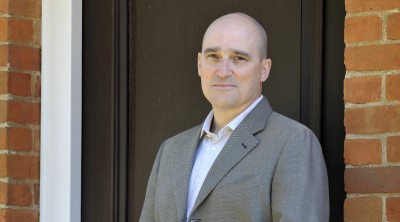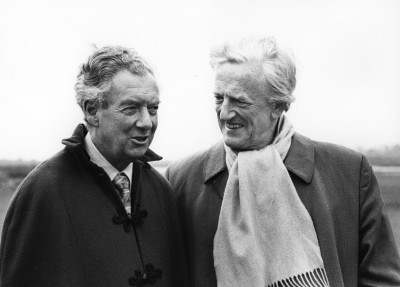
Festival Miami bids Britten a happy birthday
The celebrations of the 100th birthday of the British composer Benjamin Britten have been widespread, and have included not just operas on various world mainstages, but chamber works on small programs to be found hither and yon.
Tonight, one of the last Festival Miami concerts closes with a tribute to Britten hosted by tenor Tony Boutté, a University of Miami professor and founder of the Baroque music ensemble Arcanum. Boutté worked with Sir Peter Pears, Britten’s life partner, in the early 1980s and has long been an admirer of Britten’s work.
But even though Britten’s music is well-known and has been scrupulously preserved with all the available technology of the 20th century, there are still some surprises out there. And tonight will mark the official first live premiere of Three Small Songs in its orchestral version, and the United States premiere of another Britten song, Everyone Sang.
“I gave the world premiere of ‘Everyone Sang’ in the late 1980s, when I was a budding professional, and had studied in England with Peter Pears just before he died,” Boutté said. “I felt honored to premiere the orchestral version of that song … It hasn’t been done much since then, and it’s never been done here in the States.
“He wrote the ‘Three Small Songs’ when he was 17 or 18, and there’s a version for piano and a version for orchestra. The piano version was performed on the same concert at which I did ‘Everyone Sang,’ and the orchestra version was performed on the radio. I’ve been told by the Britten-Pears Foundation that (tonight’s concert) is the first public performance. So that’s pretty exciting.”
Benjamin Britten (left), with Peter Pears at Snape, England, in 1975. Photo by Victor Parker; courtesy Britten-Pears Foundation
Boutté will be joined tonight by a variety of UM organizations and musicians. The Frost Chorale, under director Karen Kennedy (formerly director of the Master Chorale of South Florida), will perform the Choral Dances from Britten’s 1953 opera Gloriana, written to honor the accession of Queen Elizabeth II. The Frost Symphony under Thomas Sleeper will play one of the composer’s final works, Suite on English Folk Tunes (A Time There Was), and Alan Johnson’s Frost Opera Theater will present a scene from another Britten opera, A Midsummer Night’s Dream, based on the great Shakespeare comedy.
Harpist Deborah Fleisher will perform part of Britten’s Suite for Harp, and two instrumental solo works will be played by UM students: pianist Anastasiya Naplekova will perform the Twelve Variations on a Theme, and violist Emily Jones will play the Elegy for solo viola. Boutté will also sing the first work he heard of Britten’s, the Canticle III (Still Falls the Rain), written in 1954 to a poem by Edith Sitwell, and set for tenor, horn and piano; Johnson and hornist Richard Todd will join Boutté for the performance.
“I took a lot of care — I hope it shows — in choosing the pieces. I wanted to be as representative of Britten as possible, not necessarily of his musical style, but of his life,” Boutté said. For example, the Elegy was included because the viola was one of Britten’s first instruments, and the Gloriana choral pieces were chosen to call attention to the composer’s choral mastery.
“I just tried to fit in as much as possible in the time allotted that would show who he was,” he said. “A lot of people will come to the concert who will not know much more about him than his name. And I hope they leave with an idea of how diverse he was, and how smart he was.”
The Canticle III has a special place in Boutté’s affections.
“The ‘Canticle’ is one of my favorite pieces of his. It’s really touching and magical,” he said, adding that the composer’s impressive level of technique was one of the aspects of his work that drew Boutté to it. “What grabbed me in the beginning was (Britten’s) connection to the text, and the passion with which it was pulled together. It culminated in a really passionate piece. And as I got to know it better, I realized how intricately put together it was… I’m someone who appreciates structure and passion at the same time, and that’s what he was so great at.”
Britten, who died in 1976, is perhaps best known today for his 15 operas, particularly Peter Grimes, Billy Budd, The Turn of the Screw and Death in Venice. His Young Person’s Guide to the Orchestra, a series of variations on a theme by Henry Purcell, is a staple of the orchestral repertoire, and his great War Requiem is one of the finest works of 20th-century choral composition. But he also wrote a large amount of instrumental music, including three string quartets and concerti for piano, violin and cello, and this centenary celebration has brought renewed attention to the whole scope of Britten’s life work.
“I perform a lot of modern opera, and his operas are as well-crafted as I think they can be. His subjects are timely; he’s a very relevant composer. But that said, I think he’s now more in the canon. He’s not a modern composer anymore; he’s part of the repertoire,” Boutté said.
”He’d be just fine without a 100th birthday celebration,” he said. “Sometimes we have composer celebrations, and I think, ‘That’s great, we can celebrate [Ferruccio] Busoni. He might need it.’ But Britten doesn’t. And so it’s icing on the cake for those of us who know and love his work.”
Benjamin Britten 100th Birthday Celebration: A Boy Was Born begins at 7:15 p.m. tonight at Gusman Hall with a pre-concert lecture by UM professor Karen Henson. The concert begins at 8 p.m. Tickets range from $15-$30. Call 305-284-4940 or visit festivalmiami.com.
Recent Content
-
Artsarticle ·
-
Artsarticle ·
-
Artsarticle ·

